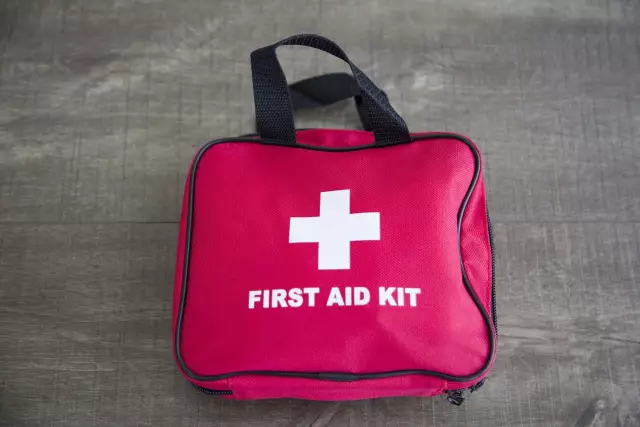- Author Curtis Blomfield [email protected].
- Public 2023-12-16 20:44.
- Last modified 2025-01-23 17:01.
In everyday life, any ailment, as a rule, does not cause panic. There is always a pharmacy with the necessary medicine not far from home or work. Long trips are a special case. On an airplane, a head may suddenly ache, in a village, in a country house - a burn may occur, in a resort abroad - food poisoning may occur. A first aid kit on the road will become an indispensable assistant in such cases.
Composition of the first aid kit

The composition of the first-aid kit largely depends on your state of he alth, chronic diseases, the area where you are going, and other features. So, if you have a business trip to a neighboring city, the first-aid kit on the road can contain only the medicines that you need daily (vitamins, medicines for pressure, headaches, ear and eye drops, etc.). If the final destination of the trip is a remote area (village, village, camping overnight), the composition of the first-aid kit will expand significantly.

1. Remedies for motion sickness. If you are traveling with a child, then the children's first aid kit on the road must certainly contain pills for motion sickness. Adults are also prone to this ailment, so if the trip islong, or you plan to use water modes of transport, then it is better to take care of the appropriate medicines in advance.
2. Help with acclimatization. Change of time zones, climatic zones, sudden pressure drops - all this has a negative impact on the human immune system and results in its failures. For such cases, the first-aid kit on the road should contain the appropriate medicines: pressure pills, immunomodulating drugs, anti-herpes ointments, etc.
3. Support for the stomach. Traveling is always associated with a change in diet. Unfamiliar exotic food, dry food, unsatisfactory sanitary and hygienic conditions - all this can cause indigestion, dysbacteriosis, nausea, gas formation. It would be useful to complete the first aid kit with adsorbents and antidiarrheal drugs.
4. Suppression of allergic reactions. Even if you do not suffer from allergies, it is still better to take antihistamines with you on a long trip through an unfamiliar region. The body can react unpredictably to unfamiliar environmental factors and allergy medications will come in handy.
5. Fight against a cold. Trips are invariably associated with drafts, temperature changes. The first-aid kit on the road should be equipped with appropriate drugs for sore throat, cough, fever.

6. Anesthesia. Headache, toothache and other types of pain are not the best companions of any trips. It is advisable to have special drugs with you to suppress suddenpain.
7. Dressing. Bandages, cotton wool, iodine, brilliant green - all this may be needed if you plan to go on a hike, go deep into a remote area. In other cases, as a rule, it will not be difficult to find a dressing material.
8. Repellents and sunscreens. These funds are simply necessary if a first-aid kit is going on the road with a child. Children's skin is especially susceptible to sunlight and insect bites, so you should take care of the prevention of negative consequences in advance.






